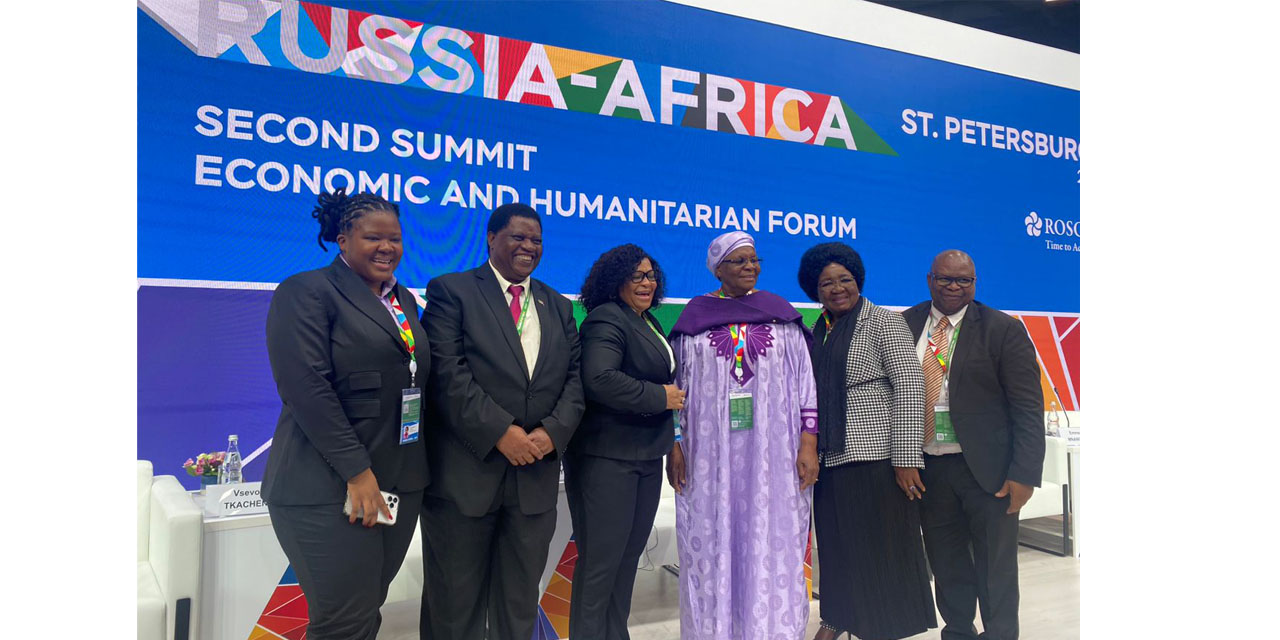Niël Terblanché
Geopolitical instability influences the balance of power between nation-states leading to uncertainty, tensions, and conflicts which pose a challenge to maintaining international security.
Netumbo Nandi-Ndaitwa, Namibia’s Deputy Prime Minister and Minister of International Relations and Cooperation in her capacity as the SWAPO Party Vice addressed an international roundtable discussion on international security in the context of geopolitical instability and inter-party cooperation in St Petersburg, during the Russia Africa Summit and said the people of Namibia and that of the host country have a long strong cooperation that will be cherished.
“The SWAPO Party is honoured to have been invited to participate in this important strategic gathering,” she said.
According to Nandi-Ndaitwa, geopolitical instability is complex and multifaceted as it relates to international peace and security and it requires careful analysis and consideration.
“Geopolitical instability influences the balance of power between nation-states leading to uncertainty, tensions, and conflicts. In such a scenario, maintaining international security becomes a challenge,” she said.
She added that geopolitical instability can be caused by many factors, including territorial disputes, ideological differences, resource competition, and the proliferation of weapons of mass destruction and added that such a situation cannot be left unattended.
“One of the key aspects of addressing international security in the face of geopolitical instability is inter-party cooperation. That is so because parties are political institutions that are closer to the people and can appreciate their aspirations,” she said.
According to Nandi Ndaitwa, inter-party cooperation can ensure an open and effective collaboration and coordination between different nation-states, and international organisations to collectively address security challenges and promote stability.
She added that inter-party cooperation can take various forms, such as bilateral diplomatic consultations, multilateral agreements, security alliances, and person-to-person contacts.
“Inter-party cooperation is important as it also allows nations to pool their resources, expertise, and intelligence together to effectively address common security threats. By working together, countries can enhance their collective security and deter potential aggressors,” she said.
She said that cooperation fosters dialogue and understanding between nations, reducing the likelihood of misunderstandings, miscommunication, and miscalculations that can escalate into conflict. Cooperation can help establish norms, rules, and institutions that promote peace and stability.
According to Nandi Ndaitwa, international organizations like the United Nations, regional security mechanisms, and bilateral alliances are established to play a crucial role in facilitating and strengthening cooperation, resolving disputes, and preventing conflicts.
“For these international bodies to be effective, it is necessary for like-minded ruling political parties to coordinate their activities and their input in those bodies’ operations, to ensure adherence to international law and norms. In so doing nations can build trust, mitigate security dilemmas, and foster an environment conducive to peace and stability,” she said. She said that geopolitical rivalries, conflicting national interests, and divergent ideologies can hinder collaboration and consensus-building and added that power and historical grievances can create mistrust and hinder cooperation efforts. “Overcoming these challenges requires skilled diplomacy, open negotiation, and willingness to compromise,” she said.
According to Nandi Ndaitwa, inter-party cooperation is crucial.
“It is not a panacea for all security challenges because some issues may be deeply rooted in historical, cultural, or ideological differences, making consensus more difficult to reach. Therefore, a comprehensive approach that combines diplomacy, economic development, human rights promotion, and conflict resolution mechanisms will be required,” she added.
She said that international security in the face of geopolitical instability requires robust inter-party cooperation. “By working together, nations can address common security challenges, establish norms and institutions, and promote peace and stability for global sustainable development to be realised,” she said.




